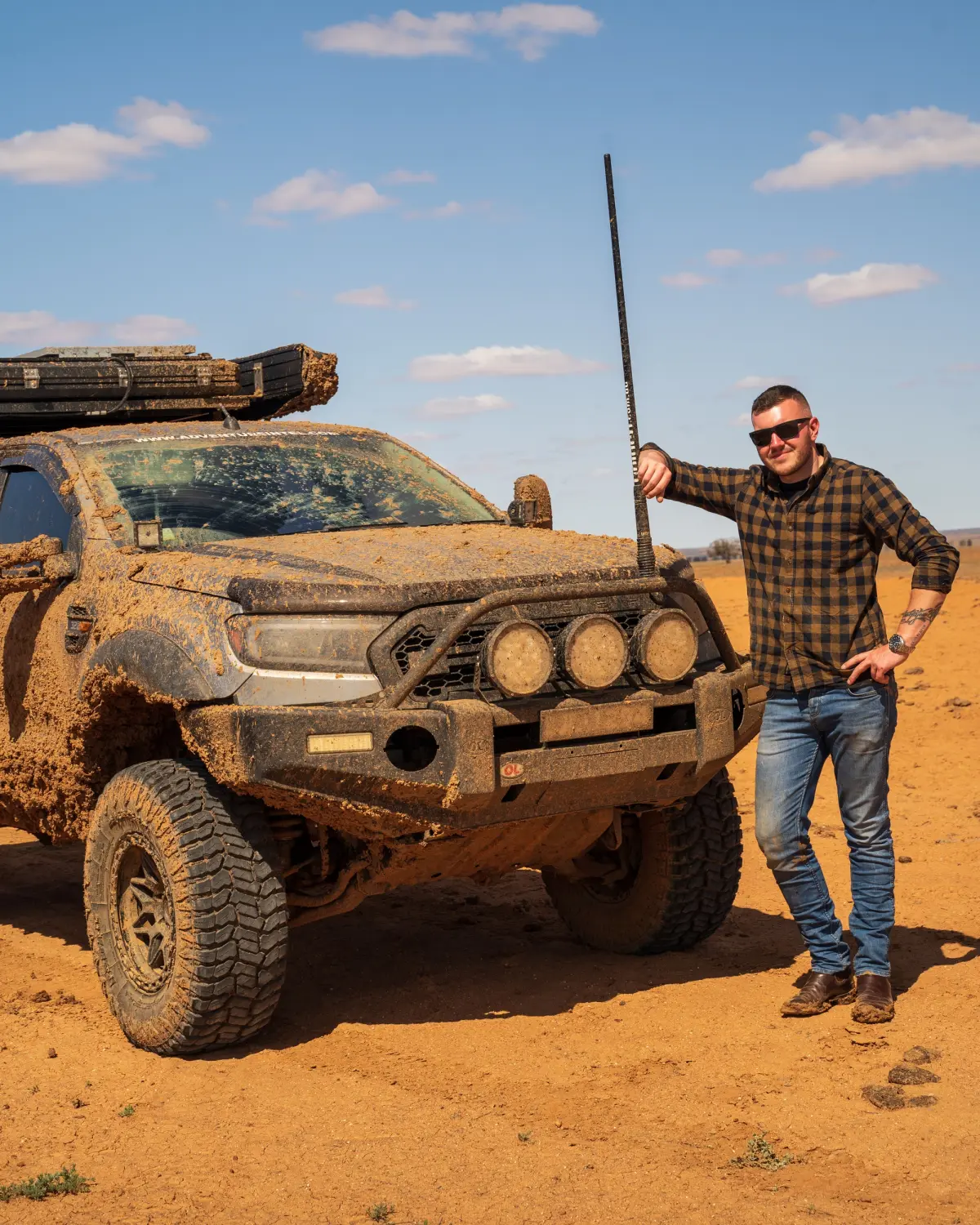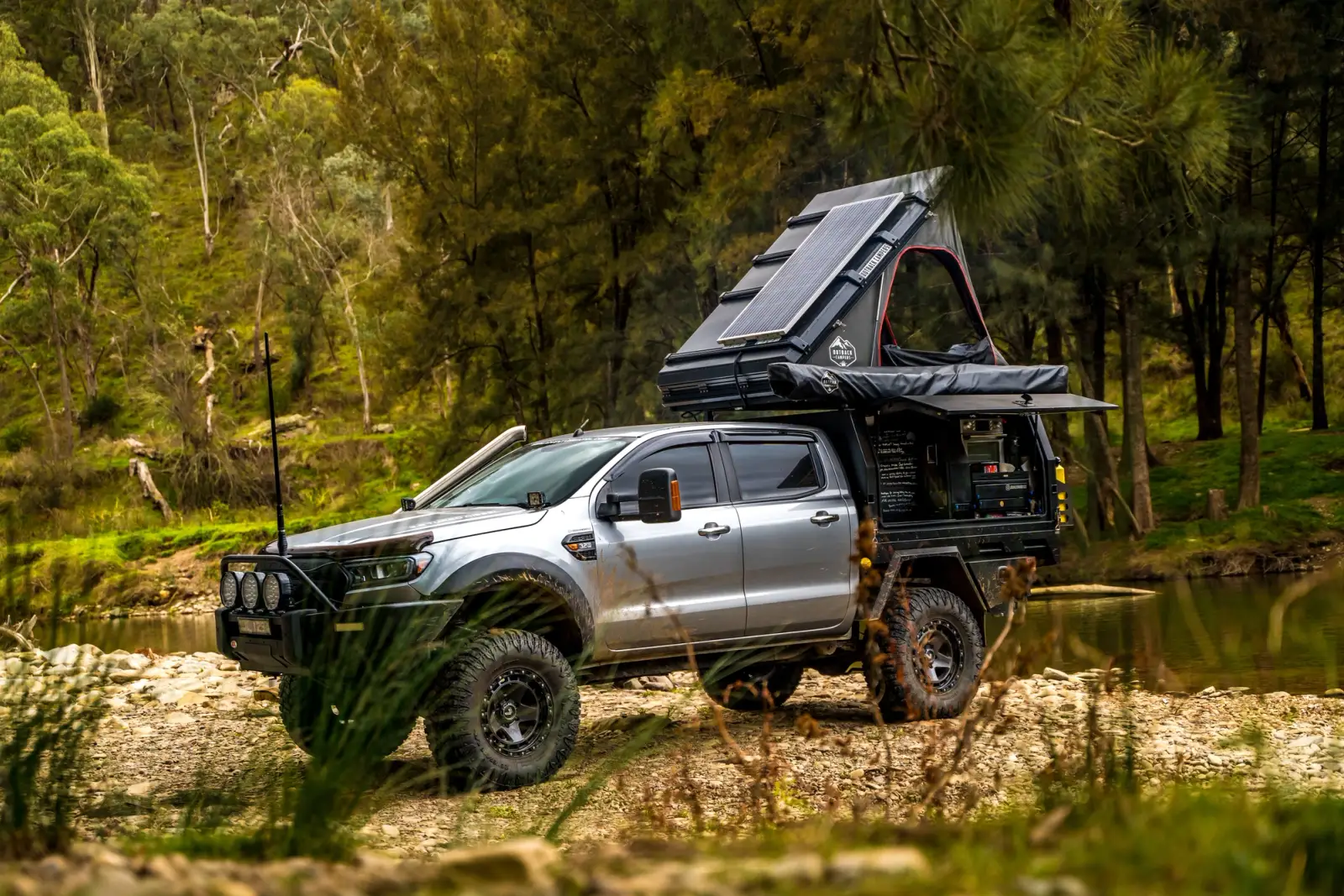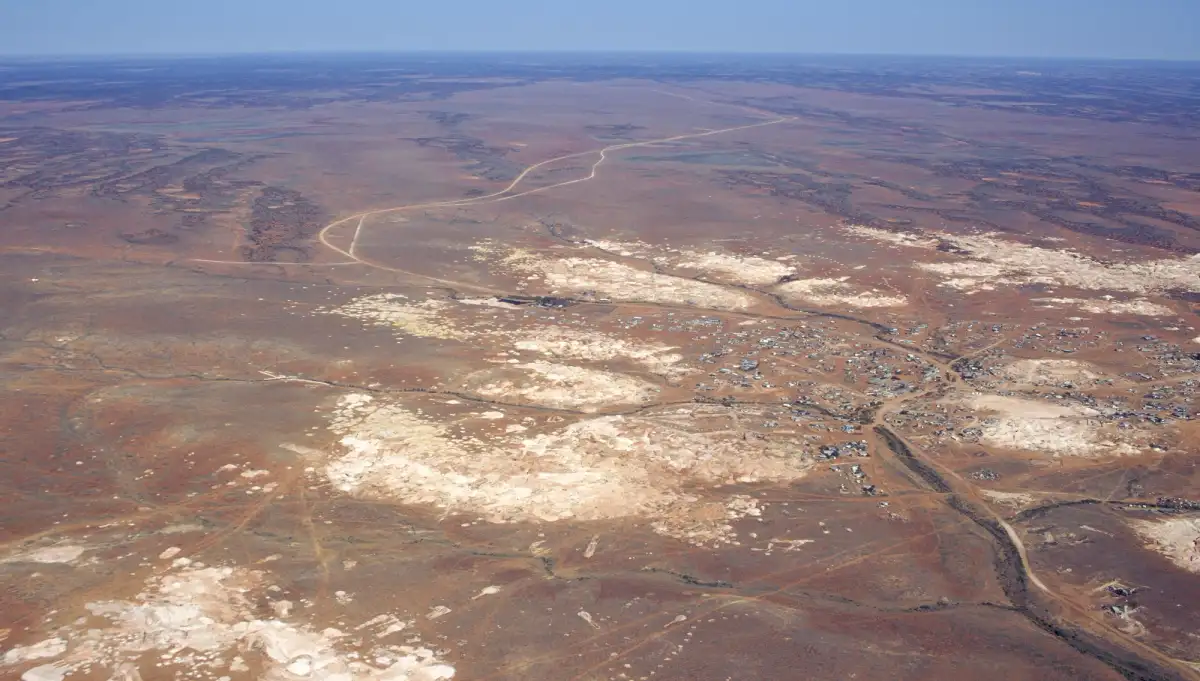If you’re anything like me, you’ll agree when I say there’s nothing better than hitting the tracks, finding a cracker camp and enjoying a night under the starlit Aussie sky. Though, your level of enthusiasm for such activities may be directly correlated to what you’re sleeping in. There’s no shortage of options when it comes to camp accommodation, but I reckon one of the best is a roof top tent (RTT).
With so many different styles and options out there, it can be tricky to know which rooftop tent is right for you. In this guide, I’ll break down the types of rooftop tents available, their pros and cons, and some tips on what to look out for, so you can pick the perfect RTT for your next 4X4 adventure.
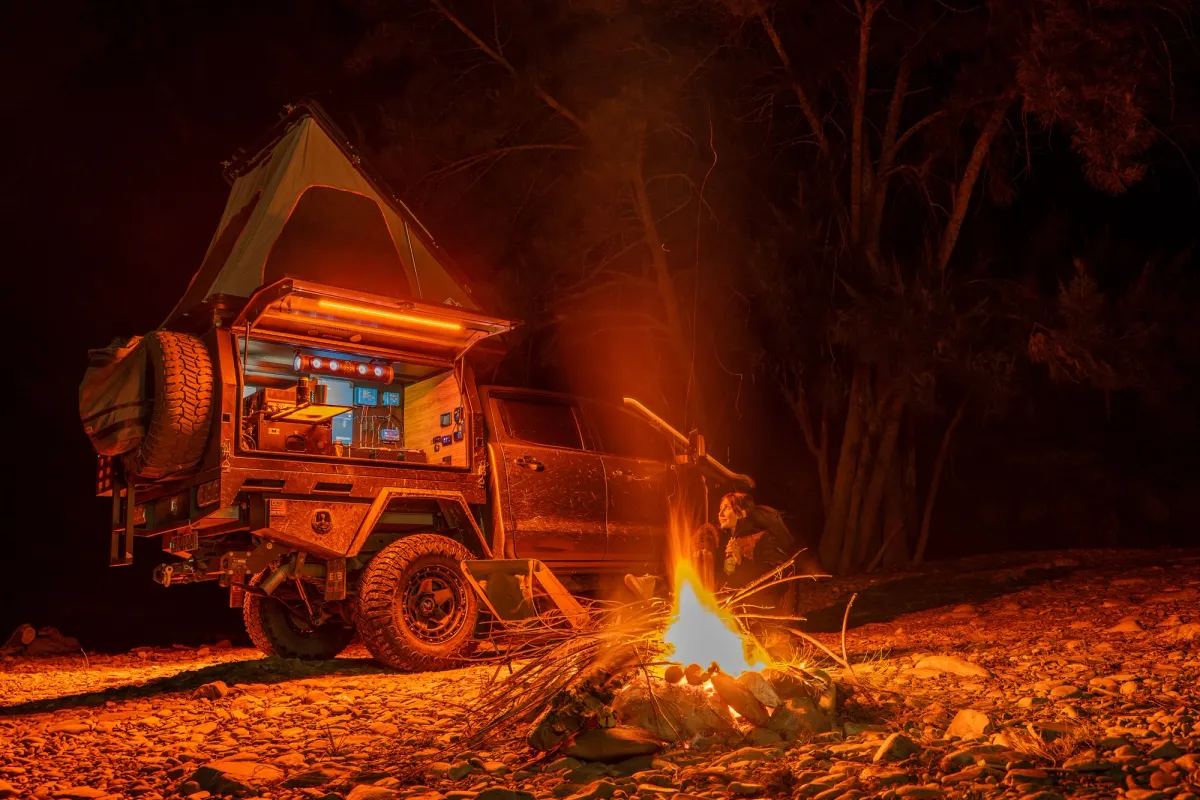
campfire with roof top tent outback
Hard Shell Rooftop Tents
Hard shell RTTs are exactly what they sound like—they have a tough exterior that protects the tent when it’s not in use. Most hard shell tents pop up vertically or hinge open from one end like a clamshell, creating a sturdy, elevated sleeping platform in around 30 seconds. Having tried almost every type of RTT, these are my top choice. Their ease of use and versatility make them extremely hard to look past.
Positives:
- Quick and Easy Setup: Hard shell tents are a dream when it comes to setting up and packing down, they’re by far the quickest and easiest setups on the market. Most of them can be fully set up in less than a minute, making them perfect for those who don’t want to fuss around after a solid day on the tracks.
- Durability: Their tough exterior offers added protection against the elements, be it heavy rain, hail, or harsh Aussie sun. They’re also less likely to get damaged by stray branches or road debris and mud.
- Aerodynamics and Fuel Economy: Hard shell tents generally have a lower profile and more aerodynamic shape when packed down, which can help reduce wind resistance and improve fuel efficiency as well as alleviating the top heavy feeling some RTTs can give.
- Load bearing: Most hard shell RTTs come with their own set of roof rails which are perfect for mounting things like solar panels and surfboards.
- Bedding: Most hard shell RTTs can store bedding when packed up, this is a huge bonus as it not only saves on setup/pack down time, but also on space.
Negatives:
- Price: Hard shell tents are generally the most expensive option, which can be a dealbreaker for some buyers.
- Weight: Hard shell RTTs are typically heavier than other tent types, which means you’ll need to check your vehicle’s static and dynamic roof load capacities and potentially upgrade your roof racks.
- Limited Space: Due to their design, hard shell tents can be a bit cramped inside. If you’re looking to accommodate more people or want extra room to spread out, you might find these tents a bit tight.
Who Are They For?
In my mind, the biggest drawcard for hard shell RTTs is their durability. If you’re a solo traveller or couple planning to use their RTT more than just once every couple of weeks, a hard shell RTT is for you.
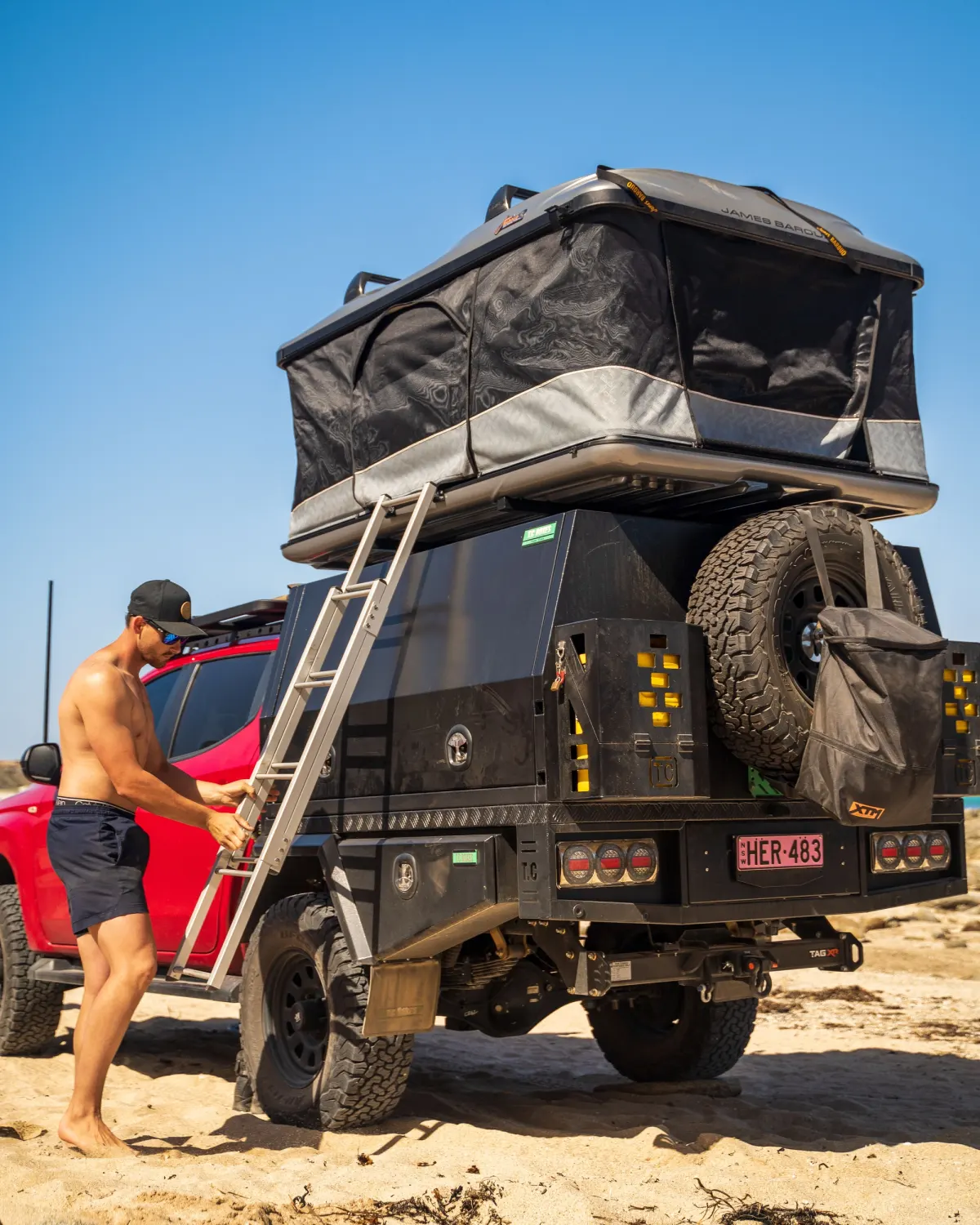
hard top roof top tent
Soft Shell Rooftop Tents
When RTT first became available they were all soft shells. Soft shell tents are the more traditional style of rooftop tent, featuring a fold-out design that provides a larger sleeping area and more headroom. They often come with annexes or additional rooms, making them a great option for families or groups. Soft shell tents have a bad name in the 4X4 industry thanks to poor quality mass-produced products but, if you get your hands on a decent quality soft shell RTT they aren’t a bad shout.
Positives:
- More Space: The fold-out design typically allows for a larger sleeping area, and many models come with annexes that can be used as extra sleeping quarters, gear storage, or even a changing room.
- Lighter Weight: Soft shell tents are generally lighter than hard shell options, making them a better choice for vehicles with lower roof load capacities.
- Affordability: Typically speaking, soft shell tents are the more budget-friendly option compared to their hard shell counterparts.
Negatives:
- Longer Setup and Pack Down Time: While still relatively quick compared to traditional ground tents, soft shell tents can take a bit more time to set up and pack away, especially when dealing with annexes and extra accessories which all get a bit fiddly.
- Durability: The fabric material is more susceptible to damage from the elements, UV exposure, and rough handling. In extreme weather conditions, they likely won’t hold up as well as a hard shell tent.
- Bulkier When Packed: Soft shell tents tend to be bulkier and taller when packed down, which can increase wind resistance and negatively impact fuel economy as well as reducing the vehicle's roof clearance.
Who Are They For?
Soft shell tents are great for families or couples looking for more space and comfort who may not be on the move to a different location every day. They’re also a good option for budget-conscious adventurers who still want a quality RTT without breaking the bank.
Hybrid Rooftop Tents
Hybrid roof top tents are less common. They aim to combine the best parts of both hard and soft shell tents. These tents usually have a hard shell base and roof, with soft fabric sides that expand out to provide more space.
Positives:
- Quick Setup: Hybrids are typically quicker to set up than traditional soft shell tents but still offer a bit more space compared to most hard shells.
- Decent Durability: The hard shell components provide protection against the elements, while the fabric sides allow for a more spacious interior.
- Versatile Design: The hybrid design can give you more versatility in how you set up camp, often with the option to add annexes or other accessories.
Negatives:
- Price: Hybrids are often priced in the same range as hard shell tents, making them a more expensive option.
- Weight and Size: Hybrids can be quite heavy, and their packed size usually isn’t much smaller than a full soft shell tent.
Who Are They For?
Hybrids are ideal for those who want the best of both worlds—quick setup and plenty of space—without compromising too much on durability.
Things to Consider When Choosing a Rooftop Tent
With the basics out of the way, here are a few more factors to consider before making your decision:
- Vehicle Compatibility: Make sure your vehicle can handle the weight of the tent you’re considering. You should also check the dynamic and static load ratings of your roof racks and vehicle to avoid any issues. It also pays to measure your vehicle's roof and ensure there won’t be any unreasonable overhang.
- Weather Conditions: Think about where you’ll be using the tent most frequently. If you’re mainly camping in the Top End’s tropical climate, you’ll want a tent with good ventilation and waterproofing. For cooler climates like Tassie, consider one with better insulation.
- Ease of Use: If you’re like me and move camp frequently, a hard shell or hybrid tent will save you time and hassle. For longer stays in one spot, a soft shell tent with an annex might be more suitable.
- Budget: It’s always tempting to go for the most expensive or cheapest option, but there are plenty of affordable tents that offer great quality and functionality. Know your budget and try to stick to it.
- Additional Features: Some tents come with built-in solar panels to power fans, 12V chargers, LED lighting. While these extras can be nice, make sure they’re not driving the price up unnecessarily, it’s not hard to install your own after purchase.
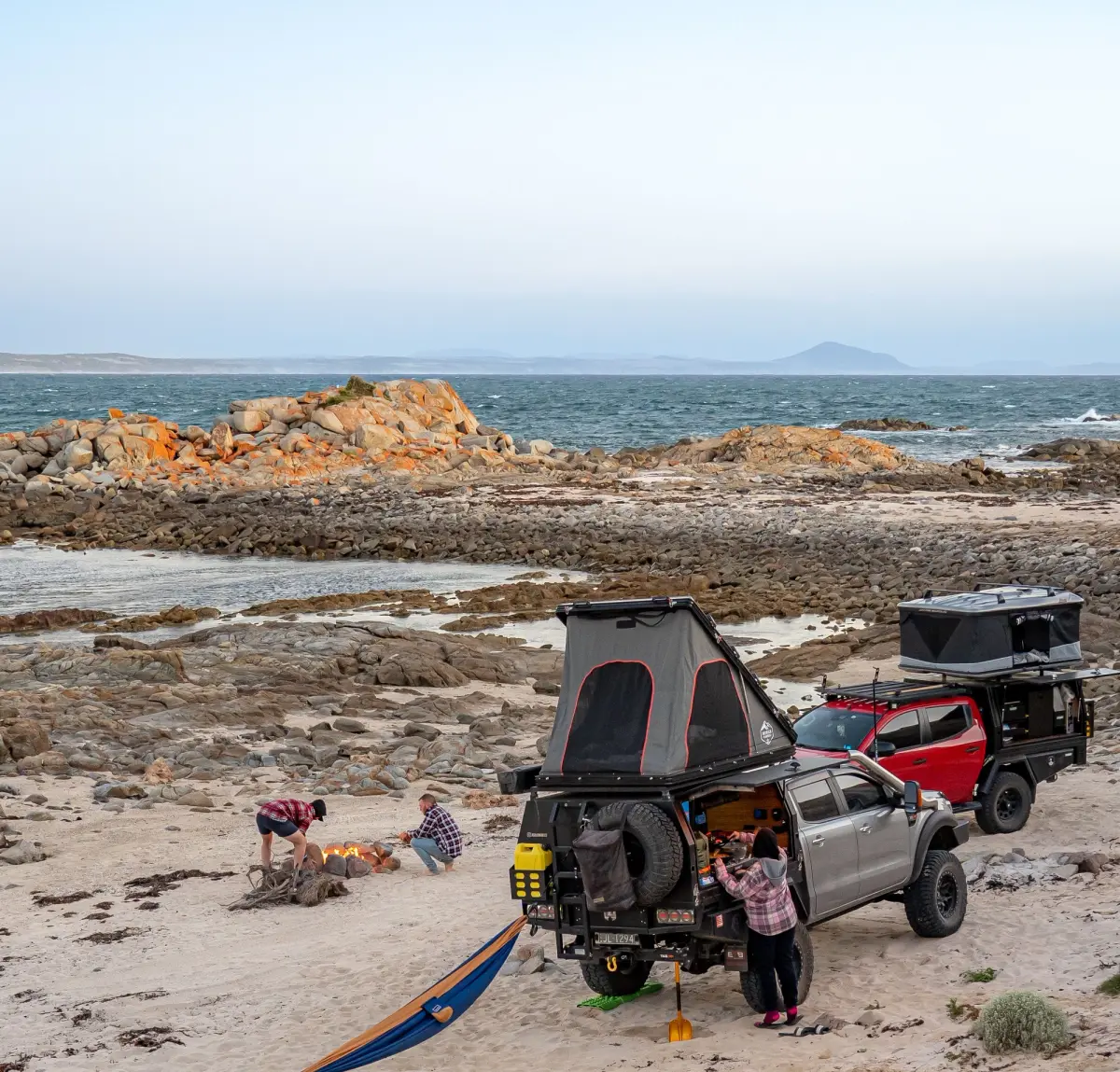
coastal camping with friends 4wd roof top tent
A reliable 4X4 coupled with a quality roof top tent is one of the best ways to explore Australia. Choosing the right one comes down to understanding your needs, your vehicle’s capabilities, and the type of camping you’ll be doing. Whether you go for a hard shell, soft shell, or hybrid, make sure you pick a tent that will keep you safe, comfortable, and ready for whatever adventure lies ahead. Don’t be afraid of second-hand RTTs either, plenty of people buy brand new tents, use them for one or two trips then sell them, if it’s in good nick and suits your needs, grab it!
If 4X4s can go there, our cover can too!
The right setup is crucial for any 4WD, caravan or camper trailer adventure, so why should insurance be any different?
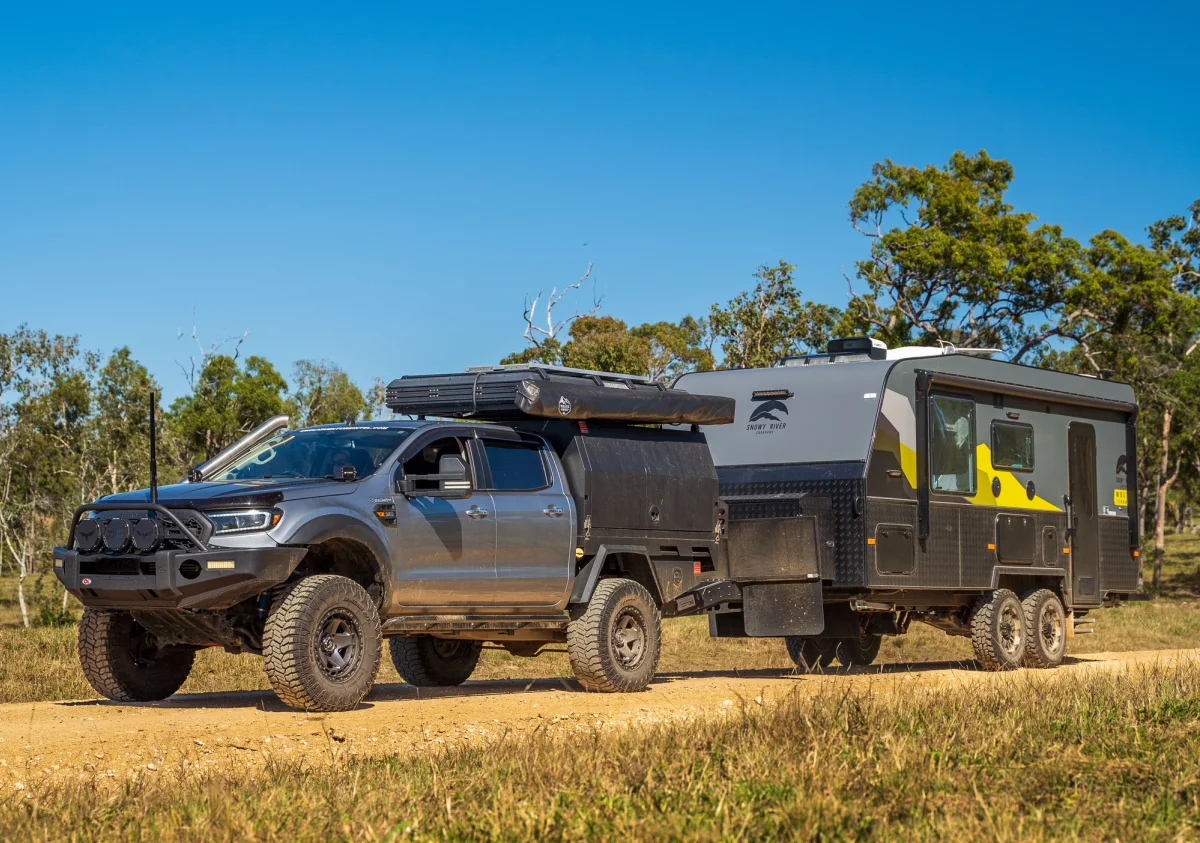
adventure intel snowy river caravans ford ranger
Instagram: @joshleonard @jessicaleaolson @adventureintelaustralia
Youtube: @adventureintelaustralia
Facebook: @adventureintelaustralia

